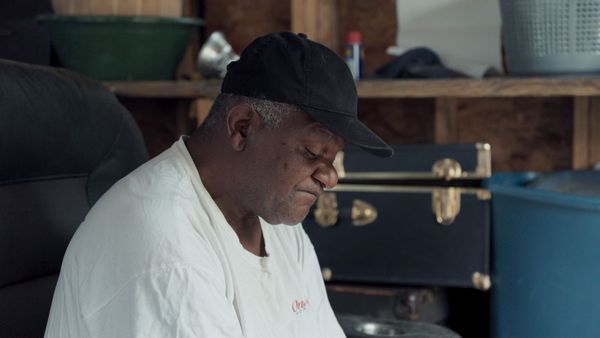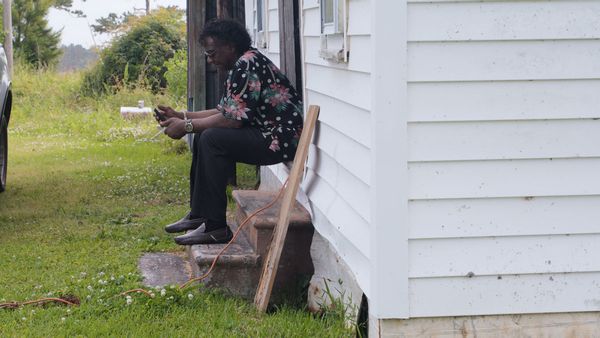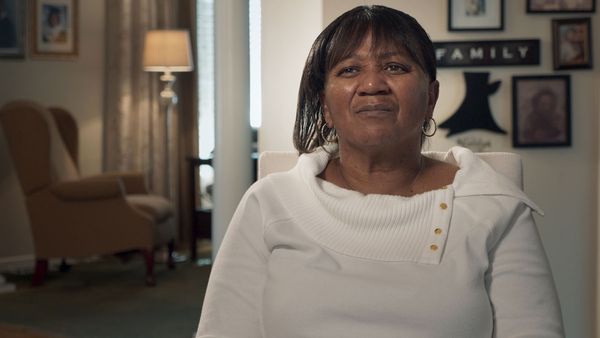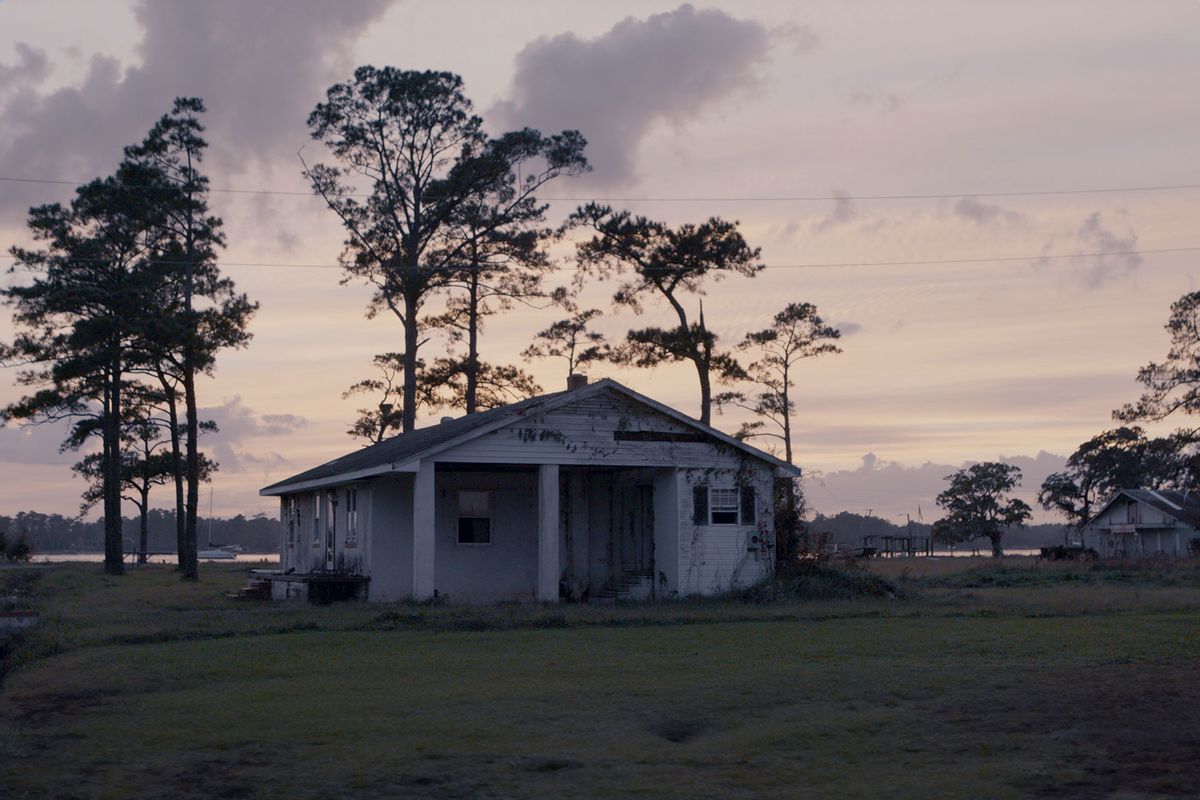Before Raoul Peck began making “Silver Dollar Road,” members of the Reels family filmed evidence that they owned the 65 acres of marshland they and their ancestors farmed that ran from the nearby forests to the river. The family fished those waters, supporting themselves by catching shrimp and crab since their forebear Mitchell Reels purchased the property in 1944. When the South was segregated, their beach was a safe recreational haven for Black folks. A scene from one home movie shows Melvin Davis, who briefly ran a club on the land, walking the green woods and fields, proudly declaring he knew every inch of it.
Gertrude Reels, the family’s matriarch, who was 95 years old at the time Peck was filming, remembers that before her father Mitchell died in 1970, he made his final wish very clear. “Whatever you do,” he said, “don’t let the white man have my land.” However, as the extensively reported 2019 ProPublica story that inspired Peck’s film chronicled, Mitchell Reels didn't leave a will, which was common among the earliest Black landowners who were denied access to the legal system.
That subjected their land to heirs’ property law, which dictates that ownership passes to the heirs of the deceased landowner. The U.S. Department of Agriculture cites heirs’ property laws as the leading cause of Black involuntary land loss, “contributing to land loss from 16 million to 4.7 million acres over the last hundred years.”
When one of the Reels' heirs who hadn’t lived on that property for 27 years claimed a prime slice of waterfront for himself in 1978, the family’s problems began — and they’ve been fighting to keep their land ever since.
“Silver Dollar Road” is a continuation of Peck’s mission to chronicle the destructive injustices wrought by colonialism. His HBO series “Exterminate the Brutes” forcefully makes that case, though quieter meditations such as his Academy Award-nominated 2016 documentary “I Am Not Your Negro” are equally effective.
Like Lizzie Presser’s story, Peck connects the core message of those works to the story of the Reels family, through whom Peck illustrates an American version of a tragedy playing out around the world: land occupation through corrupt legal trickery. In plainer terms, “Silver Dollar Road” shows us a family who did everything right only to see their American dream besieged by developers eager to parcel out their birthright to other wealthy people seeking waterfront views.
 Silver Dollar Road (Photography by Wayne Lawrence/Amazon Studios)Homes were lost, a family fishing boat was blown up and the perpetrators were never arrested. The headlining injustice culminates in Melvin Davis and his brother Licurtis Reels being held in a local jail for eight years for refusing to leave their land — all without ever being charged with a crime or given a jury trial — making them two of the longest-serving inmates for civil contempt in U.S. history.
Silver Dollar Road (Photography by Wayne Lawrence/Amazon Studios)Homes were lost, a family fishing boat was blown up and the perpetrators were never arrested. The headlining injustice culminates in Melvin Davis and his brother Licurtis Reels being held in a local jail for eight years for refusing to leave their land — all without ever being charged with a crime or given a jury trial — making them two of the longest-serving inmates for civil contempt in U.S. history.
But Peck chooses to tell the Reels' story through the perspectives of Gertrude’s daughter, Mamie Ellison, and her niece, Kim Duhon, the two relatives he describes as “holding the family tight.” Through them, we see not only the struggle but birthdays, graduations and glimpses of a life on a land Mamie calls "magical." Kim says the family's land is "not valuable to us from a monetary standpoint but valuable to us because of the history and the beauty of it."
In a recent interview with Salon, Peck reflected on this "obvious" choice. He also discussed the ways that "Silver Dollar Road" is a conscious, purposeful continuation of his filmmaking direction — and if there's a hopeful ending to this story.
This interview has been lightly edited for clarity and length.
Only in recent years has there been widespread discussion of the fact that Black land ownership has decreased by 90% within the last century. That is where I wanted to start: A lot of coverage has pertained to Black farmers losing their land. Heirs’ property laws are something a lot of people don't necessarily know about. You came to this story through the ProPublica article about the Reels family, but did you know much about these laws before it?
Yes, because it's not only in this country, you know. Minorities, Black people and the Indigenous population — everywhere. Once the concept of property became the dominant concept, it became a capitalist commodity. And who can profit from that? Usually, big landowners, big farm companies, etcetera. Usually, every single law is programmed for them.
By the way, that's a problem in the European Union. There are a lot of great laws, but it's not the small farmers who benefit from them. It's usually the big companies. In the United States, due to its own specific historical background, it has primarily targeted the Indigenous population and Black population, who are always out of the calculation. Until very recently, Black and Indigenous people were not even considered citizens, and all the laws that benefit people to acquire land — to get subsidized, or to get help when something like a natural disaster happens — this community was always excluded.
 Silver Dollar Road (Photography by Wayne Lawrence/Amazon Studios)That also explains why, if you don't have access to the principal source of economic independence and wealth, you cannot give that back to the next generation.
Silver Dollar Road (Photography by Wayne Lawrence/Amazon Studios)That also explains why, if you don't have access to the principal source of economic independence and wealth, you cannot give that back to the next generation.
You cannot have a normal life, either. When you make that connection, you can easily explain why we are still in this situation today. The consequence is not just Black farmers losing their land: It's also how you can easily explain why there is a large number of Black men in prison today, why Black families have to live in ghettos, why the school system for them is not the best one, etcetera. It is because that part of the population was never able, in a substantive way, to create economic stability.
And, when they did, they were burned down like in Tulsa. That's an eternal story of this country.
"That's why a president today can say, 'Let's make America great again.' That begs the question: When was it great for us? Give me a date.
That's why this project was incredibly powerful for me because, through the Reels family, you can basically understand the history of the United States. Again, it started with land — land that was stolen from the original population . . . And what did they build on top of that? The American Dream, which was a dream for only part of the population because the rest of the population was not even considered citizens. That's why a president today can say, 'Let's make America great again.' That begs the question: When was it great for us? Give me a date. Give me, like, a year when was it great.
I think of you as an excellent filmmaker in terms of chronicling diaspora. I think the first film I saw of yours was “Sometimes in April.” Many more people are familiar with your James Baldwin documentary, “I Am Not Your Negro.” You're a filmmaker presenting this story at a time when there are many states where this history wouldn't be taught in the best of circumstances, including in the South, where "Silver Dollar Road" is set. Only now, there's an effort to erase it. What it's like for you to kind of witness that?
Because I've been working, I think almost all my life, as a filmmaker on those themes, I made my peace, probably 20 years ago, that the backlash was so massive — and that sometimes even we who are fighting don't understand the extent of that battle. We basically lost a whole generation of combatants. That generation is the whole generation of Martin Luther King Jr., Malcolm X and all the others who survived this part of the civil rights movement and then were decimated.
And the unions were decimated. We forgot that backlash of the Reagan years, the Thatcher years in Britain. We never really reconstructed that. Who are our leaders today? Who are the kind of leaders who could resonate with the whole country? They are not there because they were killed.
I see my work as something that I need to preserve in the hope that the next generation — whether it's the next one, or the next one after that — will have at least material to reconstruct.
"Who would think that only a decade ago, congressmen and politicians would openly talk about not wanting white children to be uncomfortable while learning about slavery?"
I don't want to be pessimistic, but I see the evidence. You were talking about the backlash: Who would think that only a decade ago, congressmen and politicians would openly talk about not wanting white children to be uncomfortable while learning about slavery? It doesn't make sense. It's like a return to barbaric times, when we can be sending people to Mars, and at the same time, having that level of ignorance at the highest level of government. That’s an uphill battle, and I'm just sad to see sometimes how people are even fighting or underestimating the level of involvement that is needed.
You can't fight with tweets. I respect much more the people who are on the field, the people who are going door to door and trying to convince people, yes, something needs to change . . . people who are trying to understand their own history, people who are educated, teachers, those are the ones on the front line.
 Silver Dollar Road (Photography by Wayne Lawrence/Amazon Studios)One thing that this film does is bring all of this history and connection into the collusion in local politics between white supremacy, land ownership and capitalism into the context of this family. You just touched on something really important, which is that this is a fight that has been going on for 60 years — and it's still going on. The movie asks, who's going to pick it up? And the way it asks this, in part, is by taking the perspective of the family matriarchs, which you've said before is a very conscious choice. Can you elaborate on why that is? Even the ProPublica article led with Melvin and Licurtis and the time they spent in jail.
Silver Dollar Road (Photography by Wayne Lawrence/Amazon Studios)One thing that this film does is bring all of this history and connection into the collusion in local politics between white supremacy, land ownership and capitalism into the context of this family. You just touched on something really important, which is that this is a fight that has been going on for 60 years — and it's still going on. The movie asks, who's going to pick it up? And the way it asks this, in part, is by taking the perspective of the family matriarchs, which you've said before is a very conscious choice. Can you elaborate on why that is? Even the ProPublica article led with Melvin and Licurtis and the time they spent in jail.
First of all, it was an organic choice because when I started spending time with the family, it was obvious that Mamie was the main person. It was clear that she had to tell the story herself. Then, as a counterpart, I needed [someone from] the younger generation, which is Kim, who is already one of the two people really holding the whole case tight and holding the family tight.
Also, it was important to portray the family as a normal family. They are not heroes. They don't have special skills. They are just a normal family . . . And I needed to make sure that people would understand that and see them as human beings, not as victims. I didn't want to put the drama — the trauma — at the center.
"I needed to make sure that people would see [the Reels family] as human beings, not as victims."
It is, of course, the center point because that's the most exacerbated moment of injustice. It's clear and it's visceral, but there is life. There is an existence of those people. Their life is not just that — I could not reduce them to that.
That aspect was really important to me, and also the aspect of giving them alone the whole podium, not to try to sugarcoat or to have the other side — they’re telling their story, too — no. We don't have that time. The other side has been telling their story for centuries.
Were there other elements about the Reels’ story that made them the ideal family to talk about this issue yet also made it apparent they're a symbol of a problem that is much greater and broader than simply one family?
Well, one of the aspects is the kind of resistance that they show, and not only for a few years but since 1970, basically. That's a lot of years — and the fact that whatever happened, they stayed on the property. All of them were born there. They have three cemeteries. You can’t have a stronger case of this appropriation when there is physical evidence that those people were always there.
Also, their understanding is that land is not only what feeds them over generations, but also it's their identity. The rest of the world — it's another world for them. The only place they know is Silver Dollar Road. That's their geographical center.
We need your help to stay independent
Then, of course, the fact I think that's an important factor, as well, is that they have been documenting what was happening to them. The first time Lizzie went, she spent almost a day just going through piles of paperwork that they had accumulated, classified, etcetera. It was like a researcher bumping into a big suitcase of empirical material. That was the best instrument to tell the story because you had everything there, concentrated.
In the end, you end up talking to a grandson, who is part of the next generation, and he’s saying, “I have to take up this fight.” But what he points out, which is something that is crucial for people to understand, you touched on earlier. If they get the land back, this is a way for a small business-owning family to sustain themselves. They're never going to become extremely wealthy. They're not going to offer any competition to Elon Musk, but they'll be able to sustain themselves within that community.
That’s probably the one thing that angered me the most. It’s like you live somewhere, you have a house, you have your garden, you have your forests, you have your water, you have everything you need. You've been there, your parents have been there, your grandparents have been there and you’re just continuing the whole thing. Then, suddenly, a meteor lands on you and changes everything. You never asked for anything, even when your property is destroyed. You can't even go to the government when everybody else is getting FEMA [assistance]. You can't go because you're not qualified.
Despite all this, you survived, and nevertheless, you get that on your head, so you resist. You resist for decades, and they tell you, ‘You know what, you don't want to leave the land? You're gonna go to prison.’ And you say, ‘Well, I will go to prison.’ Then you ask yourself, 'What is government? What is it that makes those people your enemies?'
A lot of times when we see something like this, there's this compulsion to hope for a just resolution. I'm wondering if you think there's a hopeful ending to this story.
I don’t think like that. I'm not working for hope. I'm working because I have no choice — and that's how the family sees it. They have no choice but to fight and fight and fight. Hope cannot be a reason because hope is like waiting for something to fall from the sky. It will never come because this is about a system. The only way to counter a system is to fight it — and to fight its allies, too — to use all the instruments you have at your disposal to fight.
Want a daily wrap-up of all the news and commentary Salon has to offer? Subscribe to our morning newsletter, Crash Course.
And that's the idea of the film, as well. How I made the film is that it's not a story that stops . . . There is no conclusion in life. It's a continuum, you know, in the same way that you can't say the United States started with the pilgrim. Then you erase the whole story of before European imperialists began coming to this country. You jettison the genocide of Indigenous people, you erase slavery and you keep wanting to erase it today. When you cut small little stories with an ending and an end, there is no end in life except when you disappear, but you have children. The fight — if you didn't have it today — your children will have it.
For me, the film is the beginning of something else, and my hope is that it will allow other people to get together. It will allow an individual to start their own research about their own story and push them to understand, where do I come from? And what is my role today? Am I just a consumer, or do I want to design who I am and who the rest of us are?
"Silver Dollar Road" is now playing in select theaters and makes its streaming debut Friday, Oct. 20 on Prime Video.



Shares